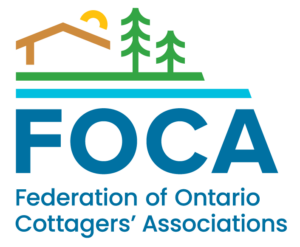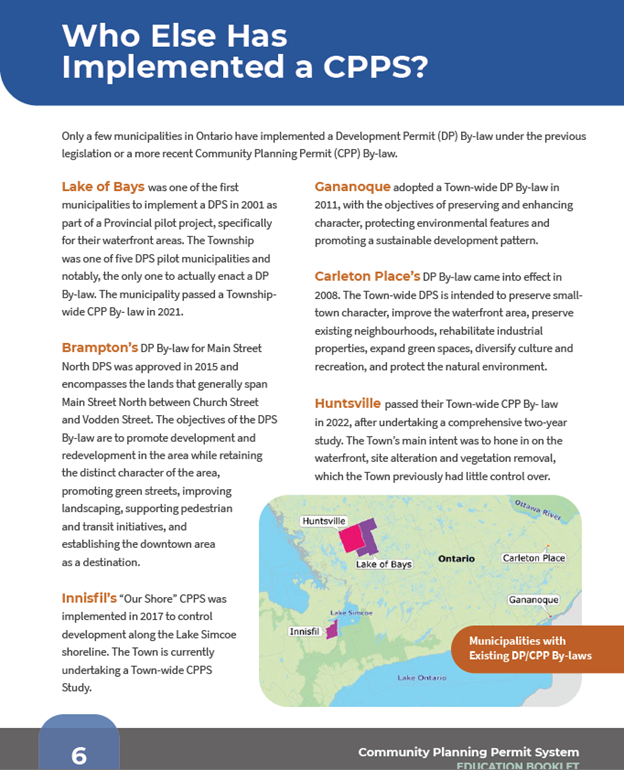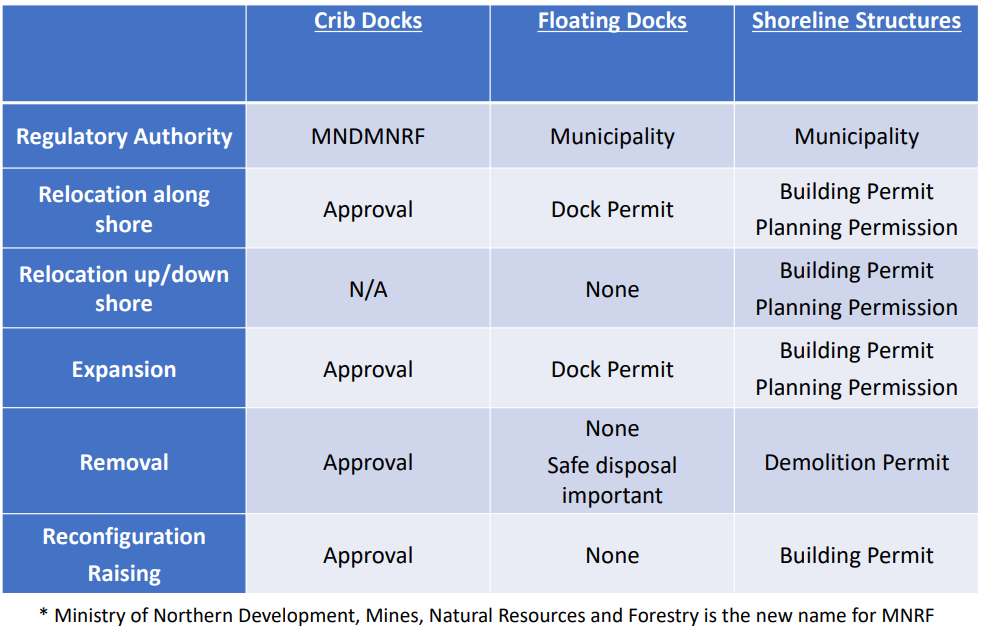
Land use planning is a critical component of maintaining sustainable communities.
Read onward for recent news, or jump directly to one of these sub-topics:

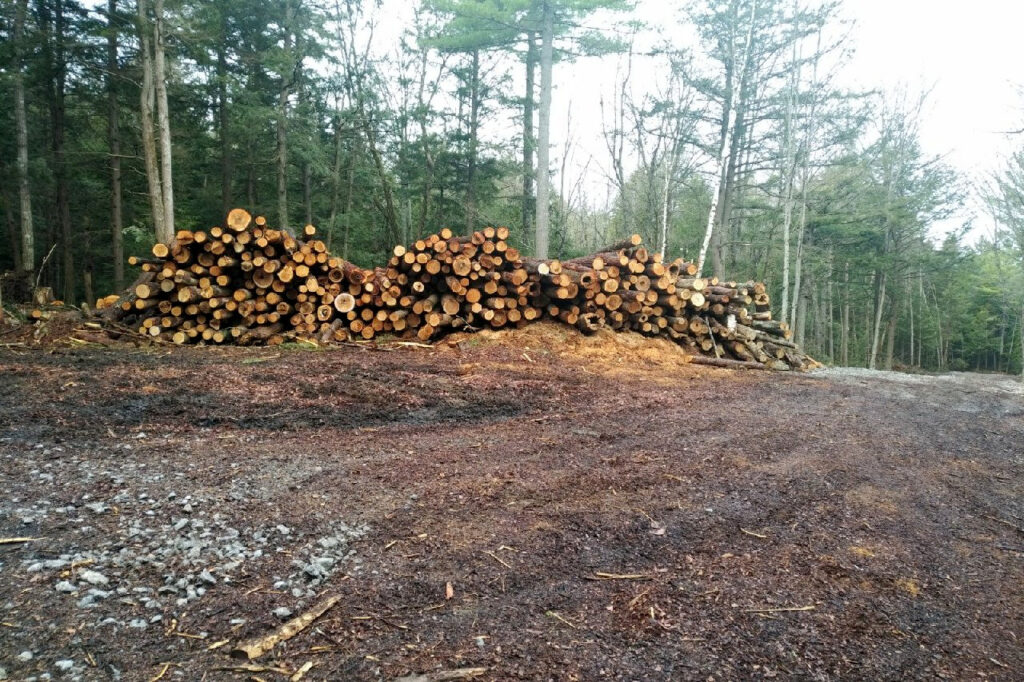
image above, courtesy Catchacoma Forestry Stewardship Committee

Other Recent News:

Jan. 9, 2025 – New year, new power: Ford government can now overrule conservation authorities (The Narwhal)
October, 2024 – with multiple changes to Provincial regulations over the past few years (see further below), it can be challenging to understand how planning decisions are made by municipalities, related to site approvals, zoning amendments or minor variances. The City of Peterborough – which is considering implementing a Community Planning Permit System (CPPS) – has created a useful Education Booklet (download PDF, 16 pages) that explains the process. The bookletoutlines what other municipalities have already adopted this model (see page 8 of the PDF, source of the image at the side). Much of the information, such as changes to the Provincial legislative framework that lead to the CPPS system, is generic and applies beyond Peterborough’s municipal boundaries.
This is a useful document that FOCA encourages members to read, and to share as a resource with other members and municipal partners in other jurisdictions as an example of positive educational communications that support public understanding and engagement in the planning process!
May 10, 2024 – FOCA submitted comments to our concerns with the Province’s Bill 185, the “Cutting Red Tape to Build More Homes Act, 2024” (ERO # 019-8369). FOCA is strongly opposed to the current proposal to remove the public’s appeal rights for the adoption or amendment of Official Plans (OP) and Zoning By-laws. In FOCA’s opinion, there is no evidence that any housing supply issues are being caused by the public appealing OP or Zoning By-law decisions. Read FOCA’s letter (download PDF, 4 pages)
Aug. 6, 2024 – Environmental and residents groups call new provincial rules barring OLT third-party appeals an attack on ‘citizen rights’ (Toronto Star)
May 21, 2024 – ‘It’s time they paid their fair share,’ northern Ontario towns cracking down on ‘illegal trailer parks’ – enforcement of 2023 trailer bylaws being enforced this summer, west of Espanola (CBC News – Sudbury)
___
May 20, 2024 – How another step in Innisfil’s planning process speeds up development: Councillors on board for amendment, but cautious: ‘I really hope Bill 185 doesn’t undermine this’ (Innisfil Today) – the municipality of Innisfil introduced an amendment to its Official Plan during a special meeting of council May 15 that enhances the pre-application consultation process adding a second stage designed to ensure development applications are complete and ready to be processed by staff before they are officially submitted. This is in response to Bill 109 that put penalties on municipalities that couldn’t turn around planning decisions fast enough. However, Bill 185 – the Cutting Red Tape To Build More Homes Act that was introduced in April – removes permission for a council or planning board to pass a bylaw requiring consultation.
___
March 7, 2024 – Ontario weakens watershed protections (again) as natural resources minister gets new powers (The Narwhal) – “Ontario’s Minister of Natural Resources will soon have the power to overrule–or bypass–environmental oversight bodies to greenlight development”
___
February 16, 2024 – a new Minister’s regulation, Ontario Regulation 41/24: Prohibited Activities, Exemptions and Permits, under the Conservation Authorities Act was approved by the Province and will replace existing individual regulations for Conservation Authorities (CAs). The new regulation’s effective date is April 1, 2024. CAs will continue to require applications for a permit to undertake otherwise-prohibited development, interference and alteration activities in regulated areas. While much of the CA regulatory process remains the same, key changes of interest for our municipal partners include:
- the definition of a “watercourse” has been amended from “an identifiable depression in the ground in which a flow of water regularly or continuously occurs” to “a defined channel, having a bed and banks or sides, in which a flow of water regularly or continuously occurs”.
- the regulated area around wetlands (“other areas”) will be consistent at 30 metres, including around provincially significant wetlands.
There are exceptions for certain low-risk activities. These changes will require CAs to review and update their regulatory mapping (as appropriate) to reflect the new regulated limits. There are also some improved enforcement powers for CAs (stop-work orders) and higher fines.
__
Feburary 2024 – the County of Frontenac and its partner townships are developing a Community Planning Permit (CPP) Bylaw that would combine tools from the Planning Act with important tools from the Municipal Act, such as controlling site alteration and tree removal to protect waterfront areas. The process is at the consultant bid stage through to March 1st. FOCA will keep members updated on developments via our monthly FOCA Elert.
Recent FINES for unpermitted development activities:
- May 2024 – a Chesley Lake landowner was fined and ordered to restore the site after the unlawful placement of material and site grading without permission from the Grey Sauble Conservation Authority (GSCA), who posted about the incident and the fine on Facebook. GSCA notes that charges tend to be infrequent, as enforcement staff work to resolve compliance issues before resorting to legal measures; however, individual landowners are liable under the Conservation Authorities Act and the new Ontario Regulation 41/24: Prohibited Activities, Exemptions and Permits for fines of up to $50,000, possible imprisonment up to 3 months, and additional fines of up to $10,000 for each day the offence continues, if charged.
- December, 2023 – Ontario man fined $48K for damaging turtle habitat (CTV News) – a man north of Parry Sound who conducted road work without a permit has been fined.
- August, 2023 – Cottager fined $45,000 for altering Georgian Bay shoreline in 6 areas without permit – pleaded guilty to filling shorelines (Metroland Media / Parry Sound North Star)
NOTES:
Find your local Conservation Authority – Conservation Ontario
Citizens can report activities impacting species at risk and protected habitat by calling 1-866-MOE-TIPS (663-8477) or online here
It is valuable to share peer stories of community groups raising their political voices to advocate for responsible land use planning and development:
November 28, 2023 – FOCA’s member group the Clearwater Lake Property Owners Association and other local stakeholders had opposed development of an energy storage facility for reasons of public safety and suitability of the site. At a late November Gravenhurst planning meeting, it was announced the developer has withdrawn its proposal as a result of public consultation and further site assessment. Read the news, as reported by Cottage Life on December 6.
November 2023 – the Ontario Land Tribunal (OLT) issued a decision on a planned development, “Muskoka Royale College”, allowing the project to go ahead but ruling that more environmental impact studies must be done before construction begins, and increasing the buffer area between planned structures and the wetlands from 15 to 30 metres. The South Bracebridge Environmental Protection Group (SBEPG)- formed from local seasonal and permanent residents – led the charge to protect the wetlands, going to OLT to oppose a development plan originally approved by the Town of Bracebridge without environmental assessments.
The Ministry of Natural Resources and Forestry recently rewrote the provincial manual used to evaluate whether a wetland is provincially significant, making it harder to get or keep this protection, but much of this particular wetland made the cut, being designated significant in June 2023 after a wetland evaluation by an ecologist hired by SBEPG. Read more in the story published by Cottage Life on December 6 (originally published in The Narwhal): The $500,000 fight to protect a Muskoka wetland
Learn more about the Ontario Land Tribunal, below.
Boathouse or Aerodrome?
There have been instances of waterfront development in Ontario that have sought to skirt planning rules and regulations by disingenuously proposing buildings that are actually boathouses as other federally-regulated aviation-related undertakings, such as aerodromes. FOCA believes this is a gratuitous and inappropriate application of the exemptions that are in place for genuine aviation infrastructure, and represents a threat to good planning and orderly waterfront development with appropriate oversight and planning input.
Our member group, the Three Mile Lake Community Club in Armour Township, worked diligently to counter such a threat in 2023. The image at the side shows an aerial view of the “aerodrome” under construction at the lower left of the image, which looks a lot like a dock with 4 boat slips.
The property association and local Council asked Transport Canada to review the application of its regulations that enable water aerodromes to be built without environmental impact assessments from provincial or local authorities.
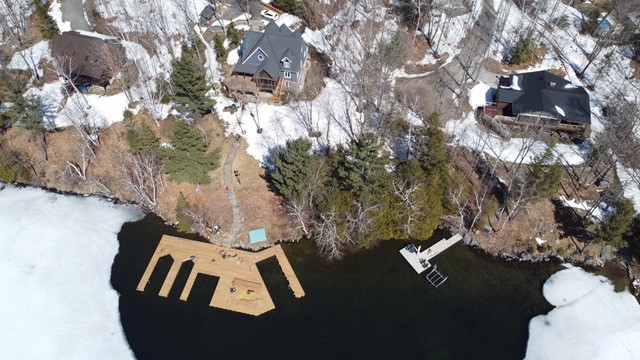
Transport Canada is reportedly still reviewing the situation, while the association created a petition that received over 500 signatures and was presented in the House of Commons by the Parry Sound-Muskoka MPP in October 2023, looking to stop such incidents from happening again.
March 2024 Update: Meanwhile, the property owner had installed a large de-icer unit to keep ice away from the dock, creating a large open water area over the winter. Concerned about possible snowmobiler impacts, Armour Council became the first Ontario municipal council to introduce a bubbler by-law to regulate any de-icing units on the lake.
Related Media Coverage:
March 12, 2024 – Massive steel dock concerns local residents and nearby municipalities (North Bay News, reporting on a recent Sundridge Council discussion with regard to Lake Bernard and ways to prevent issues like that experienced with an oversized “aerodrome” dock in nearby Armour Township)
June 9, 2023 – ‘Mega dock’ propels cottagers to seek new rules for aquatic airstrips (CBC News) – The Township of Armour council passed a resolution at its May 2nd, 2023 meeting, calling on Transport Canada to require anyone seeking to register a water aerodrome to consult provincial and municipal authorities before construction. The township has since passed a bylaw limiting the size of docks on the lake to about 45 square metres.
May 12, 2023 – New trailer bylaws coming to cottage country communities in Ontario, raising concerns (Cottage Life) – Township of Sables-Spanish Rivers (north shore of L. Huron between Sudbury and Sault Ste. Marie)
February 24, 2023 – FOCA has learned that the province has posted a public comment period to the Environmental Registry of Ontario (ERO) related to our meeting last year with the Ministry of Natural Resources and Forestry and lake association representatives concerned about floating accommodations. Jump to our dedicated webpage for details & a link to the posting.

current issue: living in a “Bill 23” World – what the Province’s October 2022 Plan means for land use planning … and new considerations with Bill 97 (April 2023)
About “Bill 97”:
About “Bill 23”:
On October 25, 2022, Ontario released the Housing Supply Action Plan: 2022-2023 that proposes to get 1.5 million homes built over the next 10 years. As part of the Plan, the government has proposed a number of legislative and regulatory changes under the Conservation Authorities Act as well as policy proposals affecting numerous other statutes and regulations. Notably, this new legislation overrides some municipal powers related to planning of their own communities, lessens protection for natural heritage and wetlands, and may increase our exposure to flooding. Public input on the proposed Bill 23 was received by the province via the ERO posting, until December 30, 2022.
Click to download a copy of FOCA’s Bill 23 submission (PDF, 15 pages, Nov.2022)
Nov. 2022: FOCA’s perspectives on Bill 23: As Ontario moves ahead with their plans for more housing with Bill 23, FOCA has many concerns about the impacts on community planning, natural heritage, and long-term affordability of the proposed changes. FOCA looks for the following in our review of the proposed changes:
- effective public participation, and transparent decision-making;
- adequate protection of water, wetlands, forests, natural heritage, biodiversity, hazard, and flood protection);
- promoting healthy rural economies;
- climate resilience.
FOCA’s highlights of Bill 23 concerns:
- protections of our remaining wetlands are critical infrastructure, to protect our communities against flooding and to improve water quality. Lessening their protection is retroactive and counter-productive. “Offsetting”, by replacing destroyed wetlands with replacements rarely if ever fully replicate the ecological functions of natural ones
- flooding impacts are managed through thoughtful development, using local knowledge and in the context of local Official Plans. Ministerial intervention in development approvals short-circuits this local focus
- site plan control authority is an important tool for municipal government to achieve larger community goals, especially when it comes to protecting water sources, reducing erosion, maintaining vegetative buffers on shorelines, and waterfront aesthetics. These powers should be maintained to preserve the livability and sustainability of our communities
- provincial intervention (limits) on development charges and permit fees will hurt taxpayers long term
- where they exist in Ontario, Conservation Authorities provide valuable watershed management insights into all manner of proposals on the landscape; their commenting role should not be excluded from potentially harmful activities or undertakings under the Aggregate Resources Act, Condominium Act, Drainage Act, Endangered Species Act, Environmental Assessment Act, Environmental Protection Act, Ontario Water Resources Act and the Planning Act etc.
Select other voices speaking out on Bill 23:
January 21, 2023 – Misguided provincial plans won’t solve housing crisis (Toronto Star)
Nov. 23, 2022 – How the Ontario government’s sweeping planning and development changes will play out in cottage country (Cottage Life)
November 20, 2022 – Ontario’s Bill 23 proposes more homes built faster, but this comes at an environmental cost, Michael Drescher and Luna Khirfan, School of Planning, University of Waterloo (on Yahoo News)
Canadian Environmental Law Association (CELA) Action Alert: Bill 23
https://cela.ca/reviewing-bill-23-more-homes-built-faster-act-2022/
Nov. 17, 2022 – Watersheds Canada Bill 23 Submission to the Standing Committee on Heritage, Infrastructure and Cultural Policy
Shoreline Resources:
September 2022 – We are pleased to announce the release of 3 new resources designed to help facilitate more resilient and healthy waterfront communities. Waterfront owners and municipal partners are encouraged to utilize these new shoreland resources from FOCA and our partners on the Watersheds Canada ‘Planning for our Shorelands’ steering committee:
- The Science Behind Vegetated Shoreline Buffers (PDF, 34 pages) – Using highly-cited and peer-reviewed scientific studies, this document outlines the benefits of vegetated shoreland buffers, and discusses why local decision makers, landowners, developers, and landscape professionals should maintain or restore native vegetation to achieve holistic protection for waterfront properties and ecosystems.
- Environmental Net Gain (BEING UPDATED, Oct/24; PDF, 6 pages) – a regulatory guide, including existing municipal by-law, policy, and Official Plan examples to emulate
- Shoreline Naturalization Planting Plan Template (PDF, 22 pages) – including tips for property owners about laying out a planting area, assessing local conditions, and choosing plants
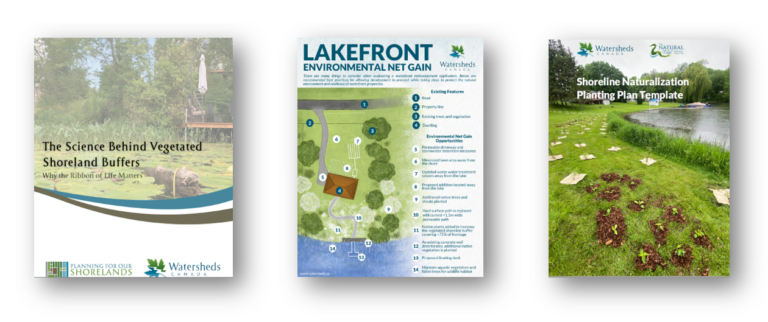
These publications will help your municipality, and you as a property owner, to enjoy healthy and resilient waterfronts in your own community.

ONGOING ISSUE: Since 2019, FOCA has expressed concern that the new land use planning process limits the grounds to appeal planning decisions, requiring proactive diligence by community members!
About Land Use Planning – an overview:
Read onward to learn more about Official Plans, the Provincial Policy Statement, and the Ontario Land Tribunal.
A central activity in the planning of a community is the making (and updating) of an Official Plan (OP) by a municipal council, a document which is intended to guide future development of an area in the best interest of the community as a whole.
Your municipal council must give you as much information as possible when preparing its official plan. And before it adopts the plan, council must hold at least one public meeting where you can give your opinion. It is up to council to decide the best way to let people know about the meeting, but notice must be given at least 20 days ahead of time, usually through local newspapers or by mail.
The act encourages early upfront involvement and the use of mediation techniques to resolve conflict. Make sure you make your views known early in the planning process!
~
The Provincial Policy Statement (PPS) serves as a guide for municipalities in the creation of their Official Plans and other planning tools by directing that cultural and environmentally sensitive features are protected. It is the provincial government’s consolidated statement on land use planning. The 2020 PPS is posted online. The PPS contains policies to direct land use decisions involving matters of provincial interest, such as:
- building strong/healthy communities
- ensuring wise use/management of resources, and
- protecting public health/safety.
~
How does the Planning Act work? The Ontario Planning Act sets out the ground rules for land use planning in Ontario, describes how land uses may be controlled, and who may control them. Municipal councils, landowners, developers, planners and the public play an important role in shaping a community. Community planning is aimed at identifying common community goals and balancing competing interests of the various parties.
The Planning Act provides the basis for:
- considering provincial interests, such as protecting and managing our natural resources
- establishing local planning administration including planning boards in northern Ontario
- preparing official plans and planning policies that will guide future development
- establishing a streamlined planning process which emphasizes local autonomy in decision-making
- exempting official plans from approval
- regulating and controlling land uses through zoning by-laws and minor variances
- dividing land into separate lots for sale or development through a plan of subdivision or a land severance
- ensuring the rights of local citizens to be notified about planning proposals, to give their views to their municipal council, and to appeal decisions to the Ontario Land Tribunal (see below).
What is the province’s role? The province:
- issues provincial policy statements under the Planning Act
- promotes provincial interests, such as protecting farmland, natural resources and the environment
- provides one-window planning service to municipalities through the Ministry of Municipal Affairs and Housing, the primary provincial contact for advice and information on land use planning issues
- gives advice to municipalities and the public on land use planning issues
- administers local planning controls and gives the approval where required.
What is the role of municipalities? The local municipality:
- makes local planning decisions that will determine the future of communities
- prepares planning documents, such as: an official plan, which sets out the municipality’s general planning goals and policies that will guide future land use, and zoning by-laws, which set the rules and regulations that control development as it occurs.
The Planning Act also gives planning boards in northern Ontario the power to pass zoning by-laws for unorganized territory within their planning areas.
~
The Ontario Land Tribunal (OLT) is an administrative tribunal that decides appeals of land use planning and development related to the Planning Act, licence applications or objections related to the Aggregate Resources Act and Mining Act, and environmental matters related to the Clean Water Act, Environmental Protection Act, and much more.
The OLT replaced the former Local Planning Appeal Tribunal (LPAT) in 2021, which in turn had replaced the Ontario Municipal Board (OMB) in 2019.
Decisions made at the local municipal level now have greater impact than before, since decisions cannot be as easily appealed, and reasons to appeal have been reduced. FOCA expressed concerns with these limitations when we submitted official comment on the proposed change to the LPAT, in 2017.
FOCA is concerned the use of Minister’s Zoning Orders (MZO) – introduced by the Ontario government in 2020 – has the real potential to override local concerns and conditions at the expense of good local planning and sound environmental advice.
Members can read more about MZOs, below.

FOCA encourages landowners to participate in local land use planning decision-making.
Stay informed about what’s going on in your community. Take part in public meetings. Talk to your neighbours about planning. Provide input to your municipal council to make good decisions.
Together, municipal councils, landowners, developers, planners and the public play an important role in shaping a community. Community planning aims to identify common community goals and balance competing interests of the various parties.
Your municipal council must give you as much information as possible when preparing its Official Plan. Before adopting the Plan, council must hold at least one public meeting where you can give your opinion, and notice of the meeting must be provided at least 20 days ahead of time, usually through local newspapers or by mail.
You can be an important part of the land use planning process by keeping informed about what’s going on in your community and by taking part in public meetings.
With your input, the municipal council will be able to make better decisions that affect your future. So if you are concerned about all or any part of a planning proposal or policy change, you should:
- find out as much as possible about the proposal
- think about how it will affect you
- talk to your neighbours about it
- go to public meetings and information sessions and let council know what you think
- write to your council member or the municipal clerk about your views
- work with council and the municipal staff to resolve your concerns.
Finally, in some cases, you may appeal to the OLT (formerly LPAT; formerly OMB) for a public hearing.
The full details of the Planning Act are posted online here.
Anti-SLAPP protection:
Public participation is an important part of land use planning, and Ontario put a law in place in 2015 to protect individuals who want to speak up and participate in the democratic process, with an Anti-SLAPP Law. “Strategic Lawsuits Against Public Participation” (SLAPP) are legal proceedings with the primary purpose of silencing public discussion or input on matters of public interest. The purpose of a SLAPP suit is to intimidate and silence defendants, forcing them to spend an enormous amount of time and money to defend meritless lawsuits. The law that protects individuals is therefore “anti-SLAPP” protection.
Bill 52, Protection of Public Participation Act, 2015 (anti-SLAPP law) came into effect in November 2015. Ontario’s legislation helps to safeguard and enhance public participation in the democratic process, and is good news for lake associations or individuals who seek to speak up and participate in public decisions affecting them and their lakes. FOCA was supportive of this important protection of public intervenors in the land use planning process.
Planning work around the waterfront? Download these handy resources from partners, about WHO TO CONTACT for necessary permissions before you start the work:
- in the Kawarthas > Best First Call Sheet (PDF, 2 pages; Lakeland Alliance)
- in the Rideau watershed > Who to Call (PDF, 2 pages; RVCA & CRCA)
Also, Georgian Bay Forever and the Georgian Bay Association held a recent webinar about shoreline construction (including docks), that included this handy reference chart (NOT for those on the Trent Severn or Rideau Waterways, that have additional requirements). Click the image at the side to enlarge the chart, and see the full set of slides here; this is slide #108.

Please note: the following is archival material, and some links to third-party resources may no longer be active.
June 2, 2022 – Crown land rules need updating: Moffatt (Haliburton Highlander)
July 2021 – the province has posted a “Citizen’s Guide to Land Use Planning” – Learn about the rules and processes municipalities follow for community development and growth in Ontario, the role of the province, how the Planning Act works, about the Provincial Policy Statement, and how you can get involved in land use planning.
July 7, 2021 – The Ontario Land Tribunal (OLT) Appeal Guide
The OLT hears, decides and mediates appeals or applications filed under specific sections contained in the following Statutes of Ontario:
The Aggregate Resources Act
The Clean Water Act, 2006
The Conservation Authorities Act
The Environmental Bill of Rights, 1993
The Environmental Protection Act
The Lakes and Rivers Improvement Act
The Mining Act
The Municipal Act, 2001
The Nutrient Management Act, 2002
The Ontario Water Resources Act
The Pesticides Act
The Planning Act
The Safe Drinking Water Act, 2002
The Toxics Reduction Act, 2009
…and more
September 2, 2021 – Crackdown on ‘flagrant disregard’ for Muskoka Lakes bylaws results in guilty plea for site alteration; Restoration of properties can add significant expense to the monetary penalties imposed by the courts, says mayor (Muskokaregion.com)
June 2021 – Local municipalities establish Official Plans and Bylaws to uphold community standards, environmental protection and safety. When faced with contraventions, enforcement becomes a commitment to uphold these standards, including dedicating the resources to see it through. See this video update from the Township of Muskoka Lakes, and related media release: “Following the issuance of Stop Work Orders, multiple property owners and their contractors have been charged under the Tree Preservation By-law and Site Alteration By-law.” More information is available from the Muskoka Lakes Association.
About Minister’s Zoning Orders:
FOCA is concerned the use of Minister’s Zoning Orders (MZO) – introduced by the Ontario government in 2020 – has the real potential to override local concerns and conditions at the expense of good local planning and sound environmental advice.
FOCA believes that all environmentally significant undertakings should be reviewed through an appropriate and efficient EA process that is open, fair, and evidence-based.
Bill 197 – FOCA wrote to the Province in January 2021, to express our concern about major changes to environmental oversight since the July 2020 introduction of the omnibus Bill 197, COVID-19 Economic Recovery Act, 2020. This Bill affected 43 different pieces of Provincial Legislation. Notable throughout the Bill was an increase in the discretion of the provincial Cabinet to, for instance, prescribe which projects are subject to the Environmental Assessment Act (EAA).
Further proposals to change the Planning Act would give Ministerial discretion to issue zoning orders, and to overrule decisions by municipal council and planning staff, even to the extent of a specific project and site details.
Further, Ontario’s Auditor General advised the government a week prior to the passage of Bill 197 of the potential contravention of the Environmental Bill of Rights (EBR). The EBR requires that any proposed amendments to legislation that could have a significant effect on the environment need to be made available to the public for comment on the Environmental Registry of Ontario (the ERO) for at least 30 days before being implemented. Ontario Premier Doug Ford has stated that he does not agree with the Auditor General’s assessment in respect of a possible contravention of the EBR.
Related News about MZOs:
- March 9, 2021 – Doug Ford says he’s ‘proud’ of controversial MZOs to fast-track development (Toronto Star)
-
March 3, 2021 – How communities are fighting back against Doug Ford’s special zoning orders (National Observer)</P.
- December 2020 – Minister’s zoning orders (MZOs) are a provincial tool used infrequently to meet urgent Provincial priorities; however, Ontario has used 33 MZO’s since April 2020. One instance includes an MZO to build a warehouse distribution centre and film studio on the ecologically sensitive Duffin’s Creek wetland in Pickering, ON. This example seems like particularly egregious overreach. Another relates to 3 major developments near Lake Couchiching in the Township of Ramara which are potentially going ahead over the objection of local residents, and that fail to meet many Provincial policies.
-
December 9, 2020 – Ford government using special provincial powers to help developer friends, NDP alleges (CBC)
-
November 25, 2020 – Massive Orbit project gets support for MZO request from Simcoe County (Orillia Matters)
-
November 21, 2020 – MZOs now ‘a weapon of mass destruction in the planning world,’ critics say (Collingwood Today)
-
November 9, 2020 – A letter requesting amendments to the proposed list of projects that are subject to the Environmental Assessment Act (part of Bill 197), penned by Canadian Environmental Law Association and signed by FOCA and 54 other experts and organizations was submitted to the Ontario Ministry of Environment, Conservation and Parks.
- October 22, 2020 – Environmental Assessment is Not Red Tape – A Primer on Recent Changes in Ontario (CELA Webinar, 51 mins)
-
August 31, 2020 – Legal Action Launched Against Ontario’s Omnibus Bill 197. An application for judicial review asks the Divisional Court to issue declaratory relief and other remedies in relation to the omnibus legislation, which overhauls the Environmental Assessment Act and amends other provincial laws. (CELA)
-
August 10, 2020 – Groups sue Ford government for unlawful failure to consult public on Bill 197 (Ecojustice)
-
August 6, 2020 – Ontario introduces sweeping changes to environmental legislation (Osler Hoskin & Harcourt LLP)
-
August 19, 2020 – Concerns raised about Ontario’s environmental assessment changes (Lexis Nexis)
-
July 22, 2020 – Activists raise alarm as province passes environmental assessment redesign during pandemic (Cambridge Times) – “Groups including the Canadian Environmental Law Association, Ontario Nature and the Federation of Ontario Cottagers’ Associations argue the bill allows the province to ignore due process for environmental protection…”
-
July 13, 2020 – EA is Not Red Tape: The Case against Ontario Bill 197 (CELA blog)
-
June 17, 2020 – Doug Ford, and speeding up the planning process (TVO)
-
January 2019 – FOCA comments on the Province’s proposed “open for business” Bill 66.
-
November 2017 – cottagers wary of proposals to ease development limits in Muskoka for “resort-to-condominium” conversions. Read the article (Globe and Mail)
-
November 2017 – Minaki Lodge development plans – Ontario Municipal Board rules against the plan; appeal pending. Read an overview (Winnipeg Free Press)
-
October 2017 – On October 6th, FOCA received notice that the Ontario Municipal Board (OMB) issued its long-awaited decision concerning an application to build on the Fraser property in the Burleigh Bay area. The OMB has denied the developer’s application and appeals, protecting two provincially significant wetlands that include Blanding’s turtle and muskellunge habitat, and over six kilometers of undeveloped shoreline in the Kawarthas, from a planned 58-unit housing development on Stoney Lake. Read more from the Friends of the Fraser Wetlands. It is the hope of the Friends of the Fraser, Jennifer David reported to FOCA, “that this decision will give hope to other grassroots groups and cottage communities involved in OMB cases and other struggles to preserve the environment and character of their lakes.”
-
October 2013 – When is a boathouse NOT an aerodrome? (pdf; 14 pages) – Seguin Township planning decision upheld by Ontario Superior Court decision.
-
May 16, 2013 –The future of resorts in Muskoka; the discussion continues. (Cottage Country Now)
-
FOCA comments on the proposed changes to MNR permitting Jan 2013
-
FOCA’s 2012 PPS Comments (pdf; 5 pages)
-
FOCA’s 2010 PPS input to the 5-year review (pdf; 3 pages)
